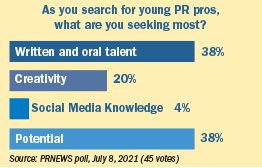
At colleges and universities, the start of summer used to signal the beginning of fall sports practices. Several weeks later, classes began.
It’s possible the Delta variant of the coronavirus, more than twice as contagious as the original strain, will interrupt the 2021 academic year. Though athletes are practicing, it’s unclear whether or not academics will be an in-person experience, at least at the start of the fall term.
We reported the bulk of this story prior to the July 27 updated mask guidance from the US Centers for Disease Control and Prevention (CDC). Implications of that policy shift may influence plans during the coming months.
Still, we’re moving ahead with our yearly coverage of the intersection of PR and academics. We asked PR professors about trends in education for the approaching academic year. Where do students need instruction most? What skills or knowledge do they hope their charges gain before heading into the business world?
We inquired of PR pros about skills/talents they seek most in young candidates. What areas require on-the-job training, which, during COVID-19, has been done remotely?
Similarly, we asked about culture-building and mentorship in a remote environment, for incoming pros who perhaps have yet to meet their supervisors in person or entered the company’s offices.

Since our pop-up survey (see p.1) found nearly 40 percent of communicators seek “potential” in hires, we asked about evaluating this trait.
We also asked academics and PR pros how the 18 months (and counting) of COVID-19 may influence what students will seek from their education, the topics and issues academics will emphasize during the upcoming term, and the communication needs of companies and PR agencies during this uncertain moment.
Emphasis on Social Justice
For years, academics and PR pros told us written and oral skills were the most important things communication students and potential job candidates, respectively, need. That’s still the case.
However, in addition to this and another perennial topic, the need for young PR pros to have fluency with business terms, theories and practices, several other trends emerged.
Besides ethics, the importance of data and the integration of AI with human intelligence, these trends include:
- an increase in the importance of business’ role in social and public affairs (academics only)
- the need for communicators to adapt quickly to changed circumstances (nearly all those interviewed)
- the need for PR pros to be comfortable working in remote and in-person settings (nearly all)
- the importance of a global, or at least a broad, perspective (academics), and
- a rise in demand for healthcare communication (a majority).
For example, following the tumult of 2020, academics anticipate an emphasis on social justice both in the classroom and in business.
“I think any [academic] program would be remiss not to incorporate social justice into its curriculum considering the current climate,” says LaShonda Eaddy, an assistant professor of PR at Penn State University.
Fortunately, many PR academics were researching CSR, CEO activism and advocacy well before 2020, she notes.
Another reason for the emphasis on social issues is that “academics and professionals are holding their breath to see if corporations’ actions will match their words from the past year, or if they were only jumping on the social justice bandwagon,” Eaddy says.
The need for communicators to advise C-suite members about choosing social justice and public affairs issues and how to communicate actions taken has become prime requirements in the profession, the academics say.
“There’s a real opportunity there,” adds Lawrence Parnell, a veteran PR professor who left business 14 years ago to run the graduate PR program at The George Washington University.
Owing to declining trust in government and media, the public expects business to solve political and social problems, he says. As a result, “CEOs have tremendous pressure on them to speak out...But they’re not trained to choose which issues to take on and [which] to avoid.”
This need led to GW adding courses in social activism and public policy.
Beating Polarization
A related trend, says Yan Jin, a professor at the University of GA’s Grady College of Journalism and Mass Communication, is how communicators can create dialogues with stakeholders to “overcome polarization.”
Students must consider how PR “unlocks its value and power” to promote change. PR professors, Jin says, were discussing this issue last year. Those discussions will move into classrooms in 2021, she predicts.
While the sample size is small, the PR pros we interviewed didn’t emphasize the need for CEOs and companies to take stands on social and political issues, at least in the context of training and top skills that young communicators need upon entering the profession.
Good Writing Remains Vital
What’s not changed is that academics and PR pros say strong writing skills are a must.
Writing and oral communication abilities are “table stakes; they’re expected,” Parnell says.
Adds Emily Poe, group president, integrated communications at Real Chemistry, formerly the W2O Group, “[Our firm is] dealing with healthcare, so the ability to communicate and tell a story about something that is nuanced is central to our work.”
In recruiting, Real Chemistry tests writing several ways. In addition to asking for writing samples, some of its groups conduct writing tests. Some candidates are tested on their ability to summarize information so it can fit on slides or in social posts.
Similarly, at Stratacomm, a Washington, D.C.-based communication firm, writing is a central requirement for all hires.
“Whether a team member is art directing, pitching media or coding websites, the ability to craft thoughtful and compelling...language for internal and external communication is a really critical component that can’t be overstated,” says Francine Housier, Stratacomm’s director of people & culture.
Writing Required
At some academic programs, the continued emphasis on writing is manifested in required courses.
At DePaul University, the graduate PR program recently instituted such a class. In part, this grew from meetings Professor Ron Culp, the professional director of DePaul’s graduate PR and advertising program, and other faculty have held during the past six years with brand communicators and PR agency recruiters.
“Pretty consistently we’d hear about the need for better writing,” he says.
PR students at U of GA’s program, for example, must take a writing class called PR Communications, says Jin. Students need to learn to write “strategically for different audiences and with purpose,” which is not necessarily the writing style taught in college composition classes, she says. This more specialized writing instruction helps students craft more effective press releases, for example.
More Table Stakes: Social and Tech Skills
An area that dominated this feature in previous years, but was almost totally absent this summer, is social media knowledge and technological prowess.
Similar to writing, it seems knowledge of social media and technology have become table stakes.
Several academics suggested that the PR industry has shifted its thinking on technology and social media, at least as a hiring criterion. In response, academia is trying to offer students “a broad overview of technology” and social media, Culp says. This is intended to give students a framework to use technology in their careers as PR pros.
Adds Jin, “technology is changing daily, so to emphasize one over the other now, or dive deeply into one” will not serve students well for the long term.
The PR pros confirmed this assessment. “The tools we most often use...such as Cision and Asana, often are not tools young professionals enter the workforce having a lot of exposure to,” says Housier of Stratacomm. As a result, the firm conducts company-wide trainings.
Paul Doyle, director, PR & communications, at Nickerson, whose company also uses Cision and Asana, as well as Salesforce and Harvest, says it’s critical to invest time into “continually training our team to ensure they understand the vital role systems and processes play in helping us work efficiently and effectively.”
Academics insist students are not getting short-changed on technology, though. Instead the emphasis is on a broad approach to technology. This allows students to adapt to technology, which is constantly changing. In addition, it allow more time to concentrate on ubiquitous skills, such as writing and strategic thinking.
In addition to writing, students and PR candidates need to fully grasp business and finance fundamentals.
Basics and a Misconception
In part, this stems from a lingering misconception: people enter PR with the notion that it’s a field where numbers and math aren’t required. With the rise of communication as a strategic component of business and digital technology’s ability to generate a bevy of data, part of the PR pro’s job involves business concepts as well as data analytics.
“I’m not going to make you an accountant,” Parnell says, “but you need to be able to talk with one if you want ‘a seat at the table.’”
Moreover, a working understanding of business terminology is crucial, Parnell argues, since C-suite members value business metrics such as margins, valuation, P/E ratios. Metrics such as likes and mentions on social media “don’t register with them.”
Importance of Research
Adds Jin, undergrad PR students need to learn about business processes and strategy, including the importance of research. U GA’s PR undergrads are required to take at least one of three management courses that cover these areas.
Culp says the importance of PR pros diving into sector research has risen with an increase of MBA generalists running companies. As some of them possess only basic knowledge of their industries, a well-informed communicator becomes valuable as a strategic advisor, he argues.
The business knowledge PR grad students need to master is more than fundamentals, Jin adds. For example, they need to learn about integration, particularly how PR relates to marketing, and the connections between communication and management.
“It’s advanced thinking, not just for a task, but a larger look at the internal and external uses of PR…its purpose and values,” she says.
The PR pros echoed Jin’s thoughts about strategic thinking’s importance. Doyle uses the term cognition.
Cognition is important, he says, because “we pride ourselves on having our finger on the pulse of the industries we serve....” An ability to “capture, process, and put that information to use is paramount” for a PR pro.
The need for broader, deep strategic thinking dominated DePaul’s recent meetings with PR pros, Culp notes. PR leaders are looking for candidates who are “broadly interested…in many topics…and have a natural curiosity,” he adds.
Business leaders, he says, want PR pros who can handle a range of areas and can adapt to changing circumstances. It’s no longer enough for PR pros to say, ‘I only want to do events’ or ‘I only want to do sports PR,’ he says.
Adds Jin, businesses seek communicators who are “constant learners...because they tend to be more resourceful, strategic, creative and able to adapt.” Flexibility, of course, became a PR watchword during the pandemic.
Flexibility: PR Word of the Year?
Indeed, the PR pros we spoke with emphasized flexibility and creativity in new hires.
“Flexibility is critical...in that at any moment a crisis might arise, [companies] may come to us with breaking news, reporters could be looking for a source on a tight deadline, or we may need to completely shift strategy for a major announcement that was set to go out,” Doyle says.
Poe agrees. “We’re in PR. We’re supposed to be able to adapt quickly and react calmly when the world is blowing up around us.” She admits, however, that beyond an internship, a candidate’s flexibility is not an easy thing to evaluate.
The need for flexibility in PR pros leads to a related issue: the ability to multi-task. It’s an issue for new and experienced PR pros, says Poe. Though she advocates communicators who need it avail themselves of time management training, she concedes “it’s a life skill” and not one that’s often taught in college.
Considering The Work Environment
Another trend that dominated this summer’s meetings with PR leaders, according to Culp, is the work environment, whether it’s hybrid, remote or exclusively in the office. One thing this has elevated, he says, is the need for incoming communicators to work collaboratively.
“Business leaders are thinking, ‘Is an office an incentive to work harder? Are some people less effective in the office? Or, is the environment less important? Will people work harder when they’re members of a team?’ They’re also discussing how to create corporate culture and spur creativity in a remote environment.”
Mixing Remote and In-Person
As a result of all this, Culp is adapting his approach this fall to include remote work and other kinds of work arrangements. He’ll hold a mix of virtual and in-person classes and assignments will include remote and in-class presentations. There will be individual and team work, he says. In addition to units on business writing, Culp says he’ll emphasize in-person and remote presentation skills. Students will present their mid-term assignments remotely. The final will be an in-person pitch.
In the professional world, PR firms also are adjusting to remote work. At Nickerson, Doyle says, changes include “a very detailed, structured” onboarding process. Onboarding at Real Chemistry also has become more detailed, Poe says.
For Stratacomm, though a large portion of staff is remote, “We’ve decided to primarily hire entry-level communicators who live within driving distance of our D.C. and Detroit offices,” Housier says. This allows the flexibility of remote and in-person mentorship and training.
Training new staff from home poses challenges, but is not impossible, Housier adds. Stratacomm’s thinking is that some staff, such as digital strategists and analytics experts, can train online. “Others thrive in an in-person, small group setting, or they shadow more seasoned communicators.” Thus is the logic of having new staff within driving distance of the office.
A related issue, building culture with so many employees working remotely, also has spurred innovation. At Nickerson each week kicks off with a Monday-morning culture and learning-focused Zoom meeting. In addition, company managers hold weekly one-on-ones with direct reports that center on goal setting and attainment. Also weekly are virtual brainstorms on pitch ideas. Lunch & Learn sessions are company-wide and virtual training on systems are held on-demand.
Similarly, Real Chemistry is taking a high-touch approach that includes one-on-ones and making sure expectations from both managers and staff “are very clear,” Poe says. Another tactic the company has used to create culture and facilitate training remotely is putting small numbers of new employees in teams. A pilot program began with a team of newly hired data analysts, Poe says. The group became cohesive quickly and took on its own personality. The concept has since spread to other parts of the company.
Learning On The Job
Each year we ask communicators a new question about hiring. Since nearly 40 percent of PR pros said seeking potential is important, we asked how they evaluate potential in the recruitment process.
“An indicator we use is how much they prepare for their interview,” Poe says. Has the candidate come with a set of questions? Is she interested in getting smarter? “If they come in cold, without preparing, it’s possible that’s how they’ll come in for meetings.”
Nickerson uses a tool called The Predictive Index. In addition, the firm evaluates young candidates’ potential based on how well they listen and respond.
Meanwhile, Stratacomm focuses on a candidate’s “values fit,” Housier says. It looks for eight tenets of the firm’s work: client service, teamwork, entrepreneurship, ethics, DEI+B (Belonging), innovation, learning and fun. “We also look for intellectual curiosity, critical thinking skills... emotional maturity...[and] the ability to solve problems.”
Ending on a High Note
It’s difficult to know exactly what the coming academic year will bring, yet Jin and Parnell think we’ll see increased demand for healthcare communication, particularly in public health. The pandemic, Jin says, “was a wake-up call...it showed how important communication is for effective public health.”
Adds Parnell, “We have a problem right now” with COVID-19 communication. “The government is struggling...with where and how you deliver the [vaccine] message...we’re just learning that going on TV with celebrities is less effective than one-on-one and online” messages. “People who understand that will have a career opportunity.”
Adds Poe, whose firm Real Chemistry serves the health sector, “We’re seeing it and living” that healthcare communication is exploding. “We’ve never been as busy….”
She’s sanguine about the field. “It’s so clear [communication can] impact public health.” Similarly, she’s upbeat about young PR pros interested in health communication, especially recent grads who are passionate about health equity and making it part of racial justice.
PR Academics and Their Dreams for Students
It’s a dream question, but with a purpose: to learn about what PR professors think would most benefit students. We asked: ‘With an unlimited budget and no restrictions (including pandemic-related ones), what courses, programs or experiences would you offer PR students?’ Here’s how our academics responded.
 Professor Yan Jin, University of GA, Grady College of Journalism and Mass Communication: Professor Jin would fund a conflict-management course that emphasized working with lawyers and another class on the fundamentals of negotiation. “As opposed to law schools and business schools, we don’t emphasize [the importance of law and negotiation] enough.”
Professor Yan Jin, University of GA, Grady College of Journalism and Mass Communication: Professor Jin would fund a conflict-management course that emphasized working with lawyers and another class on the fundamentals of negotiation. “As opposed to law schools and business schools, we don’t emphasize [the importance of law and negotiation] enough.”
Ideally, she says, these courses would include professors and students from law, business and journalism schools. The courses would benefit PR students’ leadership skills, she adds.
Another dream of Jin’s is to have courses that emphasize the philosophy of PR. “Why are [PR pros] doing what they do? What did they do years ago? What will they do tomorrow? This would be a break from the day-to-day lessons of PR,” she says.
Jin sees a practical side to her suggestion. “Fake news isn’t a new thing…it was around during the Roman Empire…having an historical perspective and really understanding the philosophy behind PR will help [communicators] be more innovative and creative.”
 Assistant Professor LaShonda Eaddy, Penn State University: Professor Eaddy would use her budget for two courses. The first would emphasize business acumen to “prepare students not only for their first jobs, but to position themselves for future management opportunities.”
Assistant Professor LaShonda Eaddy, Penn State University: Professor Eaddy would use her budget for two courses. The first would emphasize business acumen to “prepare students not only for their first jobs, but to position themselves for future management opportunities.”
The other course would be “totally dedicated to securing and excelling in your first job and career.” Most PR professors infuse tips into their courses, Eaddy says, “but I think having a more intentional focus…would benefit students greatly.” Some seminars cover this material, she says, “but I think it needs to be delved into further.”
 Professor Lawrence Parnell, The George Washington University: “I’d emphasize global PR and communication. The program at GW has an elective where grad students travel to eight capitals, including London, Brussels, Shanghai, Hong Kong and several in Latin America. In addition to learning about PR and communication in those countries, they learn about and meet media and government members and activist groups. “They come out with an understanding that the world is not only K St or Wall St…in some cases, PR is a global business.” Funding constraints mean only a few grad students are able to partake of this program. “If I had the money, I’d send everybody,” Parnell says.
Professor Lawrence Parnell, The George Washington University: “I’d emphasize global PR and communication. The program at GW has an elective where grad students travel to eight capitals, including London, Brussels, Shanghai, Hong Kong and several in Latin America. In addition to learning about PR and communication in those countries, they learn about and meet media and government members and activist groups. “They come out with an understanding that the world is not only K St or Wall St…in some cases, PR is a global business.” Funding constraints mean only a few grad students are able to partake of this program. “If I had the money, I’d send everybody,” Parnell says.
 Professor Ron Culp, Professional Director, Graduate PR and Advertising Program, DePaul University: “Let’s assume writing and business acumen are covered. There’s no departing from those essentials,” Culp says.
Professor Ron Culp, Professional Director, Graduate PR and Advertising Program, DePaul University: “Let’s assume writing and business acumen are covered. There’s no departing from those essentials,” Culp says.
As a supplement, Culp would bolster the curriculum with an emphasis on diversity and, like Parnell, global insights.
“Students need a broader insight about the rest of the world, its differences [from the US] and commonalities.” Diversity, “in every aspect,” is a “must do.”
